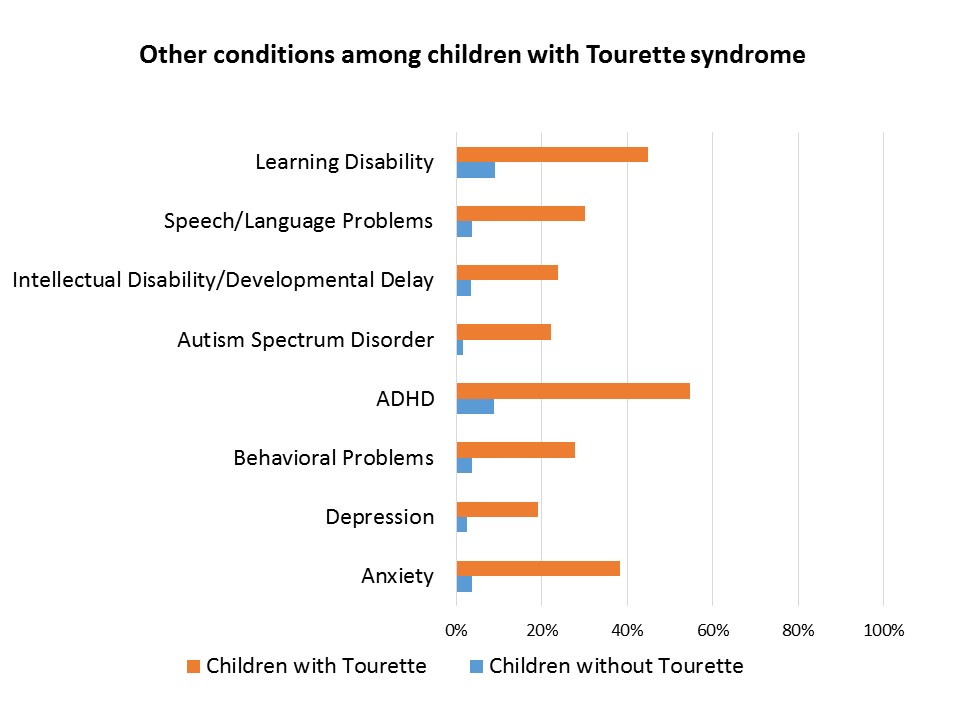Key Findings: Tourette Syndrome, Other Conditions, and School Measures

The Journal of Developmental & Behavioral Pediatrics has published findings about how having Tourette syndrome and other conditions affect how children do in school, like repeating a grade, school problems, or needing special services. The other conditions included mental, behavioral, or emotional disorders as well as learning and language disorders.
Researchers from CDC and the Tourette Association of America used parent-reported data from national studies in 2007 and 2011, and found that having another condition was a major concern for children with Tourette. Having other conditions along with Tourette was related to having difficulty in school and needing educational services. Children with severe Tourette symptoms were also more likely to experience these problems compared to children with milder symptoms. Children with Tourette were more likely to receive special education services than those without Tourette.
This is important information for healthcare providers, teachers and parents. Being aware of the potential challenges related to both Tourette syndrome and other conditions can help them to best support the child’s education.
Read the article | Watch a video summary.


Main Findings
- Most children with Tourette syndrome had other mental, behavioral, or emotional disorders or learning and language disorders.
- Compared to children without Tourette, children with Tourette were more likely to:
- Have an individualized education program (IEP)
- Have a parent contacted about school problems
- Not complete homework
- Once the presence of other disorders were taken into account, children with Tourette were still more likely to have an IEP, compared to children without Tourette.
About This Study
Data on children aged 6-17 were pooled from the 2007 and 2011-12 National Survey of Children’s Health, a nationally representative telephone-based survey of parents in the United States.
Parents reported on their child’s conditions:
- whether a healthcare provider had told them their child currently has Tourette syndrome
- how severe it was
- mental, emotional, and behavioral conditions:
- learning and language conditions:
Parents reported on the following school measures:
- type of school attended (public, private, home)
- number of school days missed for illness or injury
- how many times parents were contacted about school problems
- whether the child cared about doing well in school
- whether the child does all required homework
- whether the child had repeated a grade
- whether the child had an individualized education program
CDC’s Activities on Tourette Syndrome
Research
CDC works with partners to conduct research to better understand Tourette syndrome, including
- how many children have Tourette syndrome and other conditions
- how Tourette syndrome is diagnosed and treated
- the impact of Tourette syndrome on individuals, families, and communities
- factors that improve the lives of children with Tourette
- health risk behaviors that are more common among people with Tourette
- how best to identify tics and tic disorders in clinic and research settings
Results from this research inform public health efforts to improve the lives and health outcomes of people affected by Tourette. CDC supports education programs to help improve the quality of life of those with Tourette and their families, and CDC helps guide future research.
Tourette Health and Education Program
CDC partners with the Tourette Association of America to provide much needed health and education programs. The goal of this outreach is to increase awareness and provide information that will help people with Tourette receive needed health services, be more accepted by those around them, and have the opportunity to succeed in school and work.
The programs educate physicians, allied professionals, and school personnel, as well as those who have Tourette syndrome, their families, and the general public. The programs provide accurate, up-to-date, science-based information about the recognition, diagnosis, and treatment of Tourette syndrome.
More Information
- CDC’s website on Tourette Syndrome
- Tourette Association Health and Education Program
- CDC’s website on Children’s Mental Health
- CDC’s website on National Survey of Children’s Health
- CDC’s website on National Survey of the Diagnosis and Treatment of ADHD and Tourette Syndrome
- Information by the American Academy of Pediatrics on the role of healthcare providers in helping children with special education needs
Reference
Claussen AH, Bitsko RH, Holbrook JR, Bloomfield J, Giordano K. Impact of Tourette syndrome on school measures in a nationally representative sample. Journal of Developmental & Behavioral Pediatrics 2018; 39(4), 335–342. [Read article]